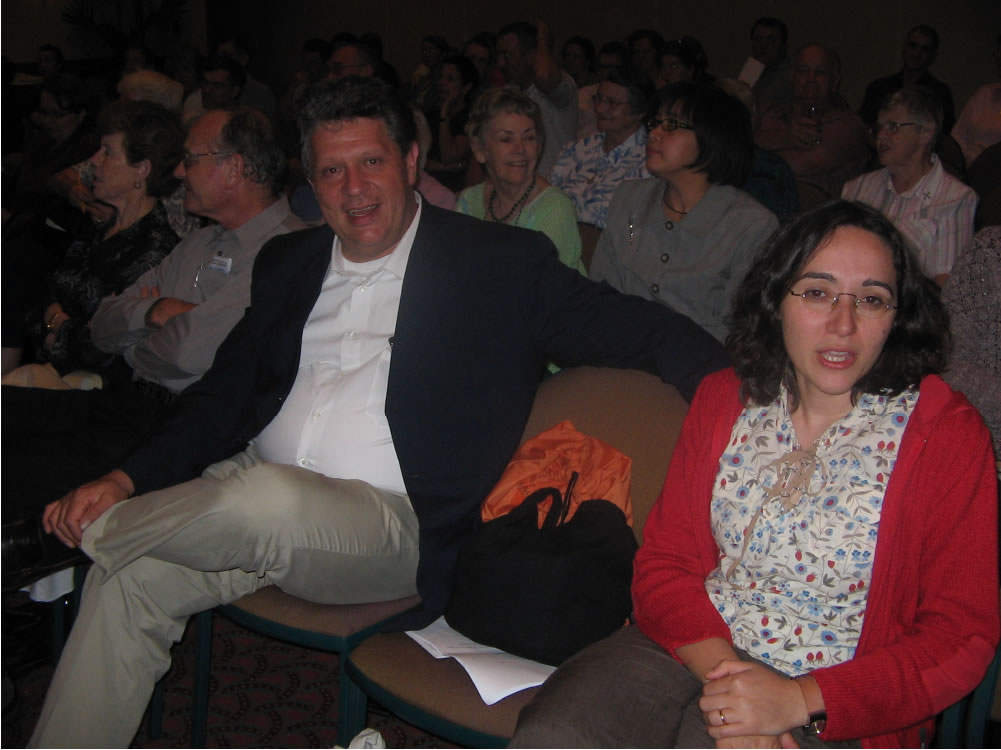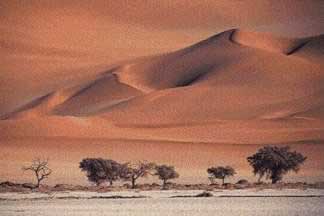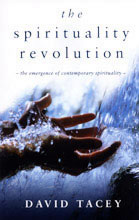Thoughts for the Month
The Jesus I know is no cold, hard Iron-Christ; nor does Jesus deserve to be reduced to smug, glib and uncompassionate irrelevancies when the real meaning of His love is what people need so desperately.
Community of Sant’Egidio
Claudio Betti & Anarita at Lidcombe Catholic Club.
 On Thursday 16th Feb a public talk was given by Claudio Betti of the Sant’Egidio Community, Rome. It was preceded by a meal for members of the St Vincent’s community and Claudio and Anarita.
On Thursday 16th Feb a public talk was given by Claudio Betti of the Sant’Egidio Community, Rome. It was preceded by a meal for members of the St Vincent’s community and Claudio and Anarita.
Many issues were talked about re- the both communities. There were many similarities but one of the main differences was the fact that St Vincent’s is so closely related to the Aboriginal Community and their spirituality especially that of land. Certainly it was good to meet with them and know that we had a connection with a community which has 30,000 members around the world.

Do not retreat into your private world,
That place of safety, sheltered from the storm,
Where you may tend your garden, seek your soul
And rest with loved ones where the fire burns
warm.
To tend a garden is a precious thing,
But dearer still the one where all may roam,
The weeds of poison, poverty and war,
Demand your care, who call the earth your home.
To seek your soul it is a precious thing,
But you will never find it on your own,
Only among the clamour, threat and pain,
Of other people’s need will love be known.
Mark’s Gospel provides an unusual realism. Most of us can take only so much reality. Mark can take a lot more. Of course, Mark shows us a Jesus who can take it all. Kathy Galloway (Iona, Scotland) writes this poem in the vein of Mark.
8th Sunday of the year: Commentary
Before commencing this commentary I ask us to leave this space — and journey into the hearts of the ancient spirits of this land. Although they remain invisible they are seated with us, keeping watch over our ritual. We thank all indigenous peoples for their soulful treatment of this earth and we apologize for the merciless way in which our governments have destroyed their highly practical and deeply spiritual way of life….. (pause)
Initially I did not know what to make of this week’s readings. After a first glance I sat down and scratched my head and wondered what it is I would say. But after deep reflection, the truth and power of these words, rushed, like a virgin waterfall, into my veins.
The first reading from Hosea sings of the necessity of our devotion to the lord. And I quote: “ I will betroth you to myself for ever, betroth you with integrity and justice, with tenderness and love”.
Integrity, justice, tenderness and love.
These characteristics seem to be severely lacking in a city such as this. As we peep outside the window we are confronted with a cruel and soulless world: there are pathetic buildings, greedy corporations and apathetic governments whom only care for the select few who are able to healthily increase our GDP. As we look to the streets we see cars and roads, followed by cars and more roads. The city sky is not filled with possibility, it is layered with different types of pollution, cloaking us in sorrow and pain.
But the truth of Hosea’s words permeate this destruction.
His words cradle the core of our universal soul.
Despite the erosion of our cherished ideals we all have it within ourselves to live with integrity, to live with justice, to live with tenderness, to live with love. And if we embody such a beautiful manner then we will be one with the lord: we will exist as one with the land.
The second reading reveals that we are letters written with the spirit of the living God.
This metaphor is beautiful and real because it succinctly explains that we are all united by an invisible yet indivisible strength.
But, we might ask – what exactly is the living God???
For me, the living God exists everywhere and in everyone: it rests in the pristine waters of Jervis Bay, it rests in the rugged beauty of the Great Dividing Range, it is present in the daily birth and death of the sun, it is at peace in the radiant glow of the tranquil moon.
More than all else however, I feel the living God is present in this hall, this sacred space, the church – our home. For beneath the façade of happiness that Sydney projects to the world, it is here in this parish of Redfern where our hearts are beating as part of the common soul: as part of the collective imagination.
And I stress our hearts do NOT beat in vain! They beat to a similar rhythm – a rhythm of integrity, a rhythm of justice, a rhythm of tenderness, a rhythm of love.
Mark’s gospel ties in neatly with the readings thus far. It is in this gospel that Jesus says, “The time will come for the bridegroom to be taken away from them, and then, on that day, they will fast”.
It is necessary for us to understand that the bridegroom Jesus speaks of is in actual fact, himself. And so today, on this first day of Lent, we prepare to fast with Jesus, in preparation for his death. To the extent that we all exist as one, it is imperative that we understand – Jesus’ suffering is our suffering. But I insist it does not end there.
For if we are to call ourselves real Christians, real brothers and sisters of the Lord, then we must expand our minds well past the narrow limits that this society imposes upon us each and every day.
So, once it is confirmed that we share the pain of Jesus Christ, we then move in graceful concentric circles and realize that the pain of the world’s poor is our pain as well. Included here are the men who lie helpless in Matt Talbot lane; included here are the homeless men and women who make shelter under the state library night after night; included here are the Aborigines on the block, the Aborigines in the long grass of Darwin, the Aborigines in remote communities scattered all over this country of which we are so so proud, the Aborigines that we throw into our jails again and again and again.
Marks gospel calls on us to suffer with Jesus and by default we are asked to feel the pain of the world’s oppressed. It is important that we empathise with those who suffer because it is from that foundation change can and will occur.
Hope is eternal. Possibility exists in each breath.
In unassuming laneways homeless shelters are alive; on a Tuesday and Friday morning there is a place, not too far from here, where the poor get to feast better than royalty; world wide, musicians bare their soul to the rhythm of freedom; whilst here, in a humble chapel, that is steeped in a proud history of social justice – we sit and we stand – giving birth to the unchangeable belief that we will work together to effect lasting social change.
Gandhi’s Seven Deadly Social Sins for Today
Mahatma Gandhi listed Seven Deadly social sins that he considered to be most spiritually damaging to humanity. This list is more relevant today than when he wrote it more than half century ago.

Politics without principle.
Commerce without morality.
Science without humanity.
Knowledge without character.
Wealth without work.
Pleasure without conscience.
Worship without sacrifice.

The desert is beautiful ….
One sits down on a desert sand dune …
sees nothing … hears nothing …
Yet, through the silence
something throbs and gleams.
What makes the desert beautiful
is that somewhere it hides a well.
Antoine de Saint Exupery: The Little Prince pp 92,93)
 The desert is not a place wherein you can decide how you want to grow and change, but is a place that you undergo , expose your self to, and have the courage to face. The idea is not so much that you do things there but that things happen to you while there silent, unseen, transforming things.
The desert is not a place wherein you can decide how you want to grow and change, but is a place that you undergo , expose your self to, and have the courage to face. The idea is not so much that you do things there but that things happen to you while there silent, unseen, transforming things.
Your job is only to have the courage to be there. The idea is that God does the work, providing you have the courage to show up. In terms of an image, this is what the season of Lent is meant to be, time in the desert to courageously face the chaos and the demons within us and to let God do
battle with them through us.
The result is that we are purified , made ready, so that the intoxicating joy of Easter might then serve to bind us more closely to God and each other.
Benedictine Lectures 2006
I want to share a few thoughts from Dr. David Tacey’s talk, “What is religion for in a destitute time?”
Darkness is a time which gives us opportunities. However the small light needs to be nurtured less the darkness over comes it. Spiritual people need to find tracks in this time.
There is a strong feeling that something is taking it’s course—something is happening. Tagore said,” Faith is the bird which feels the light and sings while dawn is still dark”.
Each of us must go and reach the place we can!!!. It is a time when religion needs to move from spirituality of dwelling to that of seeking. There must be a reversal in the fact that the locus changes– it is not a church but the world becomes the locus.
There needs to be a move from preaching to listening – evangelisation to prophetic reception. There is a desire in society for “more”. This is exploited by Consumerism. It urges and tempts people to buy more things, saying this will bring happiness…. However the “more” is a deep yearning; it is a holy longing—a connectedness to God, Allah, Budda etc; what we seek is invisible and the object of our longing remains unknown in secular life so there is a restlessness.
How do we connect with God? It is not about acquisitions but surrender — the paradox – in surrendering we will find that which we search for. Secular worldview is a form of indoctrination.
“the darkness is not knowing the time is dark”
Fear is everywhere. We barricade ourselves. There is a fear of the Divine encounter. We fear the encounter will shatter us. In our weakened state of needing to be in charge, to control everything an encounter with God is a heavy burden.
Our task is to take fear out of the God encounter and to realise that in a Divine encounter we are liberated. Receptivity allows us to welcome.
 We need to move from active preaching to receptive listening. Religion needs to down play authority and blowing their own trumpet. The priestly role is to listen to what is not being said. Jung said, ”Called or not called God is always present”.
We need to move from active preaching to receptive listening. Religion needs to down play authority and blowing their own trumpet. The priestly role is to listen to what is not being said. Jung said, ”Called or not called God is always present”.
We need to stop pumping religion into people and turn to drawing what is already there out of people. There is a need to move from moralism to mysticism.
The process of trying to get “religion” into people is called Masculine Protest – thumping the pulpit!!. Karen Armstrong, a writer, says simply, “It never works”.
Spiritual Life is like the in and out breadth. We have been very good at the out– being out there but not too hot on the in breadth. This needs to be reclaimed – mysticism.
 Young people want to feel a God within — the in breadth.
Young people want to feel a God within — the in breadth.
Frank Brennan in his response brought the whole question back to the acknowledgement of Land at the beginning. It is about knowing where we are and recognizing that the Aboriginal people have this deep spirituality connecting them to the land.. It is about acknowledging their connection with the land in a spiritual way.
These are just some of the thoughts I came away with. I am sure others who were present will have other thoughts so please share them with us.